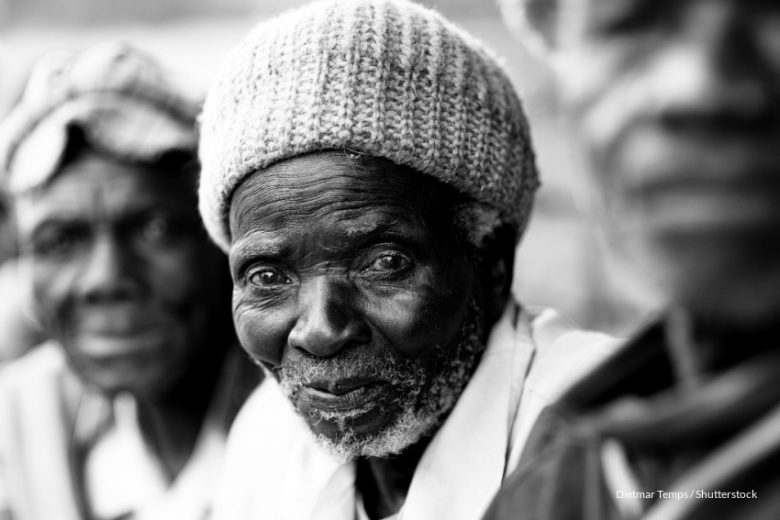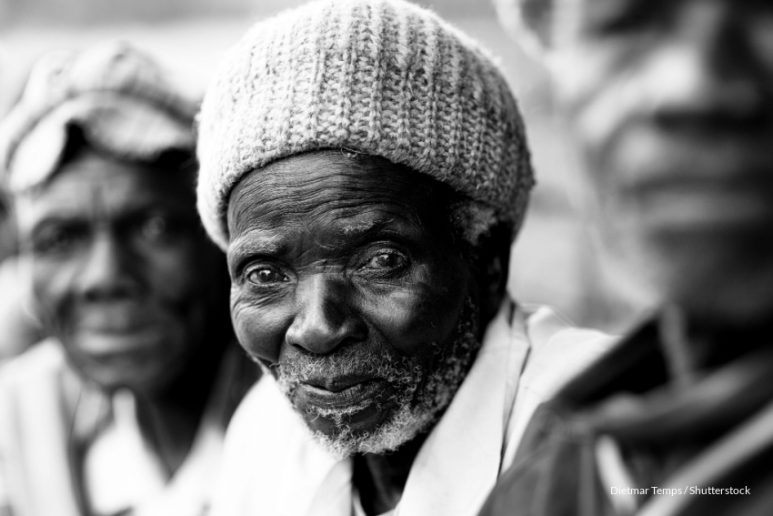By Raphael Mweninguwe
‘Cases of people being murdered on allegations of witchcraft are on the rise and the media is one of the institutions that should be blamed for this,’ says Priscilla Gavi, Executive Director of HelpAge Zimbabwe.
Gavi told Media Diversity Institute in an email response to the questionnaire that the media is to blame for writing negative stories about older persons as having a hand in the deaths of people related to the accused. She says the media portrays the elderly as witches or wizards.

‘The majority of the stories that you read about or hear from electronic media are very negative about the elderly people and they portray them in a very negative bad way,’ she says.
In Africa as a whole and southern Africa in particular cases of people being killed or burned on allegations of witchcraft are rife.
In Zimbabwe for example, Gavi points out that in Buhera district statistics show that 70% of the murders in the area are generated by witchcraft accusations.
She says the majority of the victims of witchcraft allegations are the elderly especially ‘vulnerable widowed women without a male figure to protect their interests.’
She says in Zimbabwe, like in many other countries in the Southern African Development Community (SADC), witchcraft beliefs are so strong and are part of cultural and traditional systems.
In Malawi statistics show that more that 70% of the 18.7 million people believe in witchcraft and over 80% amongst the rich and well educated are also strong believers of witchcraft.
Michael Kaiyatsa, Executive Director of the Centre for Human Rights and Rehabilitation (CHRR) in Malawi, says the killings of people for merely suspected of practicing witchcraft ‘is one of the most serious human rights violations that we are witnessing today.’
The Centre says since 2019 over 75 people suspected of witchcraft have been murdered and he says this was a worrying situation for the country.
‘People have abandoned all respect for human life and are subjecting anyone suspected of witchcraft to all sorts of human rights violations, including torture and arbitrary killings. Overwhelmingly, the victims of such violations are people least able to defend themselves, such as the elderly,’ Kaiyatsa tells Media Diversity Institute.
Andrew Kavala, Executive Director of Malawi Network of Older Persons’ Organisations (Manepo), says that over 15 elderly people have been murdered since January this year alone for being suspected of practicing witchcraft.
He says cases of witchcraft are on the rise and he calls on authorities to help contain the situation. He says witchcraft killings are a violation of people’s rights and that those suspected on having a hand in the killings should be brought to justice.
Witchcraft is very difficult to prove because its activities are done in secret. Sonia Rupcic published a research study in 2021 which was done in South Africa. In the study Rupcic describes witchcraft as an act that involves the use of muti (a diverse class of material substances with occult efficacy) or unseen forces to bring about ill effects.
In Limpopo in South Africa Health E-News reports that there is an increase in the number of elderly people being killed because of their alleged involvement in witchcraft.
The newspaper reports that Professor Mbaimbai Hlati, who is president of the Traditional Healer Association in the SADC region says something must be done to stop the killings of people believed to be witches or wizards.
In an interview Pastor Mkhize who is based in Durban in Kwazulu Natal Province in South Africa says a number of people accuse the elderly and kill witchcraft suspects out of ignorance.
Mkhize, a manager at Ekhana Old Age Home, says many people who accuse the elderly have no evidence to support their claims that those who die do so because they have been bewitched.
‘There is no evidence that shows that people who die in our villages are dying because they have been bewitched. There are a number of causes of illnesses such as Alzheimer which is dementia. If people do not understand dementia they will always kill the elderly thinking that they are doing witchcraft.’
What the media can do?
Many human rights activists agree that the media can do a lot of awareness on the issue of witchcraft and protect people’s rights.
Manepo and Media Institute of Southern Africa (MISA) Malawi Chapter in October this year signed a three-year memorandum of understanding (MOU) in which journalists will be writing and publishing stories aimed at raising awareness on the rights of the elderly people.
Manepo Executive Director Kavala who signed the MOU and MISA Malawi Chairperson Teresa Ndanga hope that through the MOU journalists will cover stories that will have an impact on reducing cases of abuse of people suspected of witchcraft not only in Malawi but in the region as a whole.
Ndanga says there is still a gap that needs to be filled. She says there is more that needs to be done on the part of the media to make sure that the rights of the elderly people are amplified.
Eldson Chagara, a freelance photojournalist based in Malawi says witchcraft is not just a belief but it is something that exists and is practiced in secret.
‘It is something that journalist needs to investigate it more thoroughly and come up with a clear picture of what witchcraft is all about,’ he says.
Chagara says because of lack of understanding the media has failed to ‘effectively’ report on issues of witchcraft and that is why ‘we are being accused of failing to help protect the rights of the elderly people.’
He says witchcraft is not knew arguing that even the Bible and the Quran recognise it. He says it is being practiced for a purpose.
‘In the villages for example, the chiefs are our custodians of culture and they know that witchcraft is real and the elderly people are the ones who even teach young people to become witches or wizards. The few elderly in the villages are victims because everybody think that they are master minders of deaths happening within the communities,’ he says.
He says the chiefs are aware that witchcraft also brings in sanity within the communities because those who steal in people’s homes cannot dare stealing from someone they know will kill them through witchcraft or magic.
‘But what the media should do is to do investigations on the issue and when it is reporting it should report better with facts and with a clear mind of knowing what they reporting about,’ he says.
Gavi agrees with Chagara. She says the media is doing very little to investigate the issues and write positive stories about what the elderly people do in society. He says the media is full of rumours.
‘There is a lot the media can do to support and promote the rights of the older persons’.
Priscilla Gavi, Executive Director of HelpAge Zimbabwe.
Pastor Mkhize says that the South Africa media is trying to highlight the plight of the older persons. He says his organization is working with a number of local media that ‘give us space to do awareness. But this does not mean that what we are doing through the media such as radio or television is enough. We will need to do more.’
Damon Leff, Director of South African Pagan Rights Alliance, warns the media that ‘it should not report accusations of witchcraft or crimes perpetrated by accusers as a result of accusations of witchcraft.’
He says in so doing the media too is a party to the crime or may be ‘giving credence to the very accusations which cause harm.’
‘When writing about other people’s beliefs or opinions about witchcraft, only what may reasonably be true, may be presented as fact. Opinions, allegations and rumours do not constitute facts,’ Leff says.
The law and the protection of witchcraft victims
In Malawi the law does not recognize witchcraft but those who are convicted of it, their conviction is based on their own confessions of their participation in the killing of someone through magic.
Even in the case where someone has accepted having performed the act of killing the authorities do not prosecute such an individual based on witchcraft but on causing bodily harm on the deceased.
The Police, however, have been seen to have taken action against people who have been involved in the killings or abuse of people suspected of practicing witchcraft in recent times.
Kaiyatsa says although some progress is being made in dealing with these cases, the government still has an obligation to protect the elderly from any kind of abuse, including abuse related to witchcraft accusations.
‘It is sad to note that despite the seriousness of these human rights abuses, there is still no robust state-led response. We had expected that the government would come up with some kind of a law or national action plan to stop these abuses, but up to now there is none,’ he tells Media Diversity Institute.
He further explained that Malawi’s courts have done little to prosecute human rights abuses linked to beliefs in witchcraft.
‘Although some individuals have been arrested for these abuses, very few of those arrests have translated into actual prosecution and conviction. This institutional failure also perpetuates a culture of impunity where people feel they can kill suspected witches and get away with it,’ he says.
In South Africa witchcraft is protected by law. But despite this legal provision South African witches face discrimination, abuse and even deaths.
In her research study Rupcic found out that chief’s courts in South Africa ‘quietly continue to adjudicate witch trials today.’ She says those accused of witchcraft are subjected to all manner of private violence and abuse.
In 2018 the Ugandan government, which is not a member of SADC but close to SADC member states, closed 23 radio stations in the country for allegedly promoting witchcraft.
The decision to revoke media licenses was taken after what government says was the media houses’ continued promotion and advertising witchcraft content.
The government says the decision was in line with the Uganda Communications Act, of 2013, which mandates the Uganda Communication Commission to suspend and revoke operating license of media houses ‘on the grounds of serious and repeated breach of the license conditions.’
Based on the accusations levelled against the media in failing to report positively on of the rights of the elderly, it remains to be seen whether the MOU between Manepo and MISA Malawi Chapter and the efforts of other media within the region will be a success.
Photo Credit: Dietmar Temps / Shutterstock

